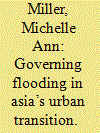|
|
|
Sort Order |
|
|
|
Items / Page
|
|
|
|
|
|
|
| Srl | Item |
| 1 |
ID:
140389


|
|
|
|
|
| Summary/Abstract |
The 21st Century not only marks the advent of Asia’s first urban era in which more than half of its population lives in cities; it is also seeing the emergence of an age of increasing frequency and intensity of environmental disasters. Urban flooding leads disaster trends and is directly impacting the lives and livelihoods of shares of Asia’s population. By 2010 more than 1.5 billion people were residing in urban areas in Asia, accounting for over half of the global urban population. The pervasive coastal and riparian orientation of Asia’s rapid urban transition is placing greater numbers of people in locations that are highly exposed to floods, cyclones, tropical storms and tsunamis. Human transformations of the natural and built environment of cities substantially add to global climate change as interactive sources of the heightening occurrence of floods. Moreover, floods contribute to compound disasters that generate cascading effects with multiple sources, interactive impacts and long-term social and economic recovery issues. The pervasive and socially uneven impacts of floods bring acute awareness of flooding as a political issue for participatory governance. In light of these interwoven complexities, responses can no longer be carried out as sector management tasks, but must instead adopt multi-sector, multi-disciplinary and multi-stakeholder approaches to disaster governance to directly link knowledge to action in preparing for, responding to and recovering from floods in urbanizing Asia
|
|
|
|
|
|
|
|
|
|
|
|
|
|
|
|
| 2 |
ID:
128521


|
|
|
|
|
| Publication |
2013.
|
| Summary/Abstract |
Asia is the most populous and rapidly urbanizing region in the world today and features 23 of the world's 40 biggest metropolitan areas. In many Asian countries, accelerated economic development, industrialization and urbanization have been accompanied by a growing acceptance that decentralization (the devolution of central state powers, responsibilities and resources to the sub-national scale)4 can lead to more effective and responsive governance in state, provincial, city and regency jurisdictions. This trend toward decentralized governance in Asia has often, but not always, been precipitated by a transition away from authoritarian regimes to more democratic forms of governance. Discourses about the desirability of democratic decentralization have typically emphasized the devolution of central state authority as the preferred means by which to empower communities and to increase the voice and participation of ordinary citizens in governmental decision-making processes that affect their lives and livelihoods. Thus, decentralization policies in urbanizing Asia have aimed to encourage the active involvement of urban residents in addressing shared dilemmas concerning issues such as environmental sustainability, public service delivery, community building and socio-political stability in often densely concentrated and ethnically diverse populations. At the same time, however, decentralization within the contexts of globalization and privatization may circumvent critical aspects of democratic procedure if sub-national government officials use their increased access to state power and resources to nurture clientelistic networks of patronage and/or to tap into wider circles of regional or global economic activity at the expense of local urban development.
|
|
|
|
|
|
|
|
|
|
|
|
|
|
|
|
| 3 |
ID:
053778


|
|
|
|
|
| Publication |
Oct 2004.
|
| Summary/Abstract |
The passing of Law No. 18 of 2001 on 'Special Autonomy for the Province of Aceh Special Region as the Province of Nanggroe Aceh Darussalam' signified a major development in the Indonesian government's strategy to resolve Aceh's protracted conflict. Ratified by President Megawati Sukarnoputri on 9 August 2001, the 'NAD law' conferred unprecedented authority to Aceh over its internal affairs. This paper evaluates the challenges that have been involved in implementing the three main tenets of the legislation -- aspects of Syari'ah (Islamic law), the return of Aceh's natural resource revenue and a provision to hold direct local elections. The paper argues that the Megawati administration's failure to redress Acehnese grievances through special autonomy largely stems from its suspicion of the NAD law itself, its greater reliance on militaristic measures than on political policies in Aceh, and pre-existing systemic factors such as Aceh's dysfunctional state infrastructure, corrupt political culture and war economy.
|
|
|
|
|
|
|
|
|
|
|
|
|
|
|
|
| 4 |
ID:
128528


|
|
|
|
|
| Publication |
2013.
|
| Summary/Abstract |
The year 2011 marked the tenth anniversary of the implementation of Indonesia's regional autonomy laws. This paper considers implications of more than a decade of decentralized governance for urban development in Indonesia. After a brief historical overview and consideration of the rationale for political and administrative decentralization issue image_86_4_Bunnellin that national context, we examine a range of critical perspectives on policy outcomes. Both media coverage and academic analyses have overwhelmingly cast decentralized governance as it has been implemented in Indonesia in a negative light. As a corrective to this, we have sought to identify positive outcomes and possibilities associated with Indonesia's large-scale decentralization project. In particular, we detail the cases of two cities which have been cast in a variety of rankings and media representations as success stories of urban development through decentralized governance: Solo (or Surakarta as the city is also formally named) and Surabaya. In the final section of the paper, we critically evaluate these two cases and discuss their wider implications.
|
|
|
|
|
|
|
|
|
|
|
|
|
|
|
|
|
|
|
|
|